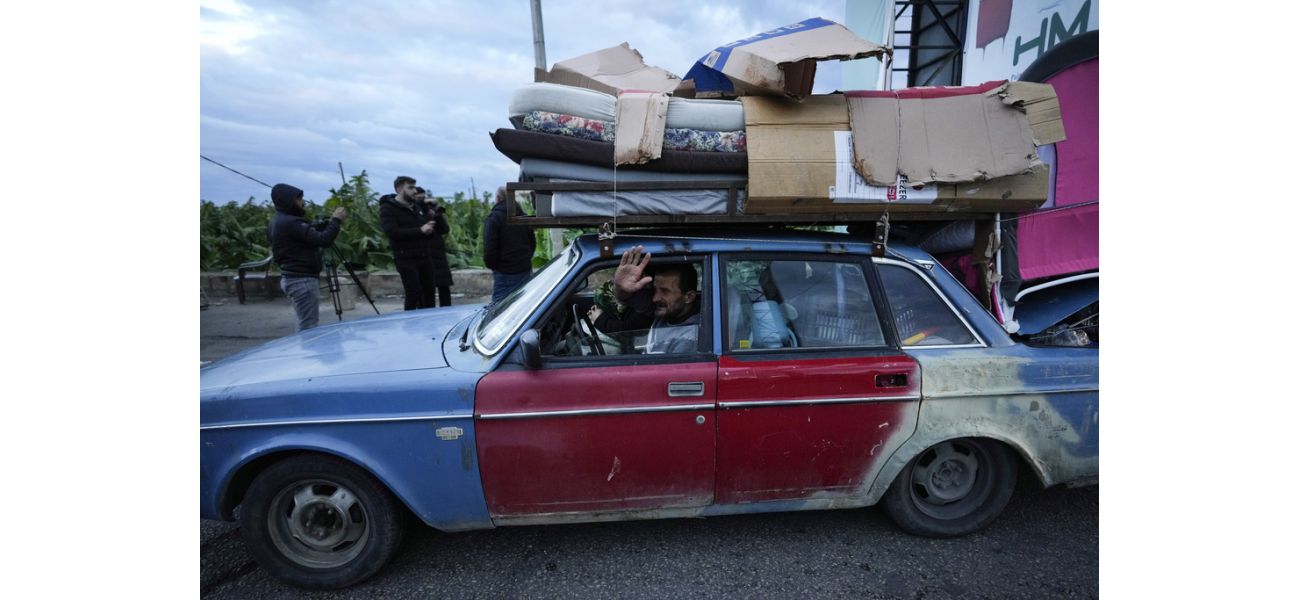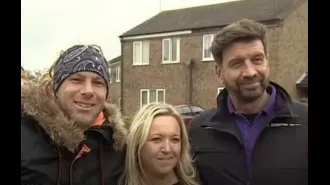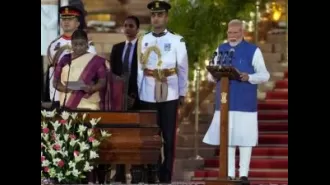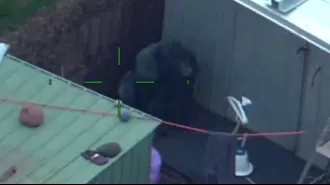Truce brings temporary peace, but concerns about potential dangers remain.
The first day of the Israel-Hezbollah ceasefire was a unique experience for both sides of the border.
November 27th 2024.

On the first day of the ceasefire deal between Israel and Hezbollah in Lebanon, people on either side of the border experienced a mixture of emotions and uncertainty. In Israel, many residents of northern communities were hesitant to return home, while others who had remained were skeptical that the deal would bring lasting peace. On the other hand, thousands of displaced Lebanese individuals returned to their homes, defying warnings from both Lebanese and Israeli troops.
The ceasefire deal, brokered by the United States, was approved by the Israeli security cabinet on Tuesday, putting an end to over a year of deadly hostilities between the two sides. However, the truce does not address the ongoing conflict in Gaza, where Israeli airstrikes killed several individuals, including children, in two schools-turned-shelters.
If the ceasefire holds, it would mark the end of 14 months of intense fighting between Israel and Hezbollah, which had the potential to draw in other countries, such as Iran and the United States. Despite the potential for peace in Lebanon, the situation in Gaza remains unresolved.
The ceasefire brought a sense of relief for the 1.2 million Lebanese and tens of thousands of Israelis who were displaced by the conflict. Mohammed Kaafarani, a resident of the Lebanese village of Bidias, described the past 60 days as "nasty and ugly," with no safe place to hide.
On Wednesday, CNN visited the border town of Shtula, just a few hundred feet away from the Lebanese border. The once-thriving community of 300 residents had been reduced to a ghost town as many had fled when the war began. Even after the ceasefire, the town remained quiet and deserted, with only a few residents remaining.
However, there were still sounds of artillery and small arms fire in the distance, reminding residents of the constant threat they faced from Hezbollah's anti-tank missiles. Ora Hatan, who stayed in Shtula throughout the conflict, described the morning after the ceasefire as "unusual" and "peaceful" without the sounds of bombing and running to shelters.
Despite the ceasefire, Hatan's fears have not subsided as she questions how long the agreement will hold. She also expressed uncertainty about what other options the Israeli government had in reaching a deal. Meanwhile, the Israeli military has given residents of northern Israel the freedom to decide when to return home, taking into consideration their proximity to the border and the state of reconstruction and damage in their communities.
The ceasefire aims to implement the nearly two-decade-old United Nations Security Council Resolution 1701, which states that only the Lebanese military and UN peacekeeping forces should be present south of the Litani River. This means that neither Israeli forces nor Hezbollah fighters are allowed to operate in southern Lebanon. While the resolution was established in 2006, both sides have accused each other of violating it multiple times.
World leaders, including US President Joe Biden, have praised the ceasefire deal, with Biden emphasizing that Israel has the right to defend itself if the agreement is broken. Israeli President Isaac Herzog also stressed the importance of guaranteeing the safety of residents in northern Israel in the emerging arrangement.
Despite the potential for peace, the reality on the ground remains uncertain for those who have been displaced. Many are hesitant to return to their homes as they wait to see if the ceasefire will hold and if their communities will be safe. As one resident of Shtula said, "I can't tell anybody to come back in this reality."
On the first day after the ceasefire deal between Israel and Hezbollah in Lebanon was put into effect, the situation was starkly different for the people on either side of the border. For many residents of Israel's northern communities, the idea of returning home was met with hesitation and reluctance. Those who have remained expressed doubts that the deal would bring any lasting peace to the region.
In contrast, thousands of Lebanese who were displaced by the war were seen returning to their homes on Wednesday. They drove back in cars filled with their personal belongings, defying warnings from Lebanese and Israeli troops to stay away from certain areas. This marked a significant moment for the Lebanese people, who have been living in a state of displacement for over a year.
The ceasefire deal, brokered by the United States, was officially approved by the Israeli security cabinet on Tuesday. This put an end to more than a year of intense hostilities that have resulted in the loss of thousands of lives. Should the ceasefire hold, it would bring an end to the 14-month-long conflict between Israel and Hezbollah, which escalated in mid-September and threatened to draw in other countries such as Iran and the United States.
However, it is important to note that the deal does not address the ongoing war in Gaza. In fact, on the same night that the ceasefire was implemented, Israeli strikes on two schools-turned-shelters in Gaza City resulted in the deaths of 11 people, including four children. Israel claimed that the strikes were targeting Hamas militants, but hospital officials reported that civilians were also killed in the attack.
Despite this, the truce in Lebanon has given some hope to the 1.2 million Lebanese who were displaced by the fighting, as well as the tens of thousands of Israelis who fled their homes along the border. One resident, Mohammed Kaafarani, who was displaced from the Lebanese village of Bidias, described the past 60 days as "nasty and ugly," stating that there was nowhere to hide from the violence.
CNN visited the town of Shtula, a small community just a few hundred feet away from the Lebanese border, on the first day of the ceasefire. The town, which was once home to 300 residents, was now mostly abandoned, with only a handful of people choosing to remain. While CNN was there, they could still hear the sound of outgoing artillery and bursts of small arms fire in the distance. This served as a reminder that Shtula was one of the most dangerous places in northern Israel, constantly under threat from Hezbollah's anti-tank missiles.
One resident, Ora Hatan, who chose to stay in her home in Shtula, described the morning of the ceasefire as "unusual" after months of living in fear of constant bombings. She expressed relief that she could finally wake up to a calm and peaceful morning, rather than rushing to the shelters. However, her fears have not completely subsided with the ceasefire deal in place, as she worries about how long it will last and if the threat from Hezbollah will continue.
The 60-day ceasefire aims to implement the United Nations Security Council Resolution 1701, which was established in 2006 and stipulates that only the Lebanese military and UN peacekeeping forces should be present south of the Litani River. This means that both Israeli forces and Hezbollah fighters are not allowed in southern Lebanon. However, this resolution has been breached multiple times by both sides since its establishment.
The deal was met with praise from world leaders, including US President Joe Biden, who also emphasized that Israel has the right to defend itself if the agreement is broken. Israeli President Isaac Herzog also stated that the safety of all residents in northern Israel should be the primary concern in this ceasefire deal.
As for when residents can return to their homes, an Israeli security official said that it would ultimately be their decision. The timing would also depend on the state of reconstruction and damage in their specific communities. It is estimated that over 62,000 Israelis have been displaced, while over 94,000 Lebanese have been forced to leave their homes due to the conflict.
Overall, the ceasefire has brought a sense of relief for the people of Lebanon and Israel, but it remains to be seen if it will truly bring lasting peace to the region. As one resident in Shtula put it, "I can't tell anybody to come back in this reality." The memories of the past 60 days will not easily be forgotten, and the fear of another outbreak of violence lingers.
The ceasefire deal, brokered by the United States, was approved by the Israeli security cabinet on Tuesday, putting an end to over a year of deadly hostilities between the two sides. However, the truce does not address the ongoing conflict in Gaza, where Israeli airstrikes killed several individuals, including children, in two schools-turned-shelters.
If the ceasefire holds, it would mark the end of 14 months of intense fighting between Israel and Hezbollah, which had the potential to draw in other countries, such as Iran and the United States. Despite the potential for peace in Lebanon, the situation in Gaza remains unresolved.
The ceasefire brought a sense of relief for the 1.2 million Lebanese and tens of thousands of Israelis who were displaced by the conflict. Mohammed Kaafarani, a resident of the Lebanese village of Bidias, described the past 60 days as "nasty and ugly," with no safe place to hide.
On Wednesday, CNN visited the border town of Shtula, just a few hundred feet away from the Lebanese border. The once-thriving community of 300 residents had been reduced to a ghost town as many had fled when the war began. Even after the ceasefire, the town remained quiet and deserted, with only a few residents remaining.
However, there were still sounds of artillery and small arms fire in the distance, reminding residents of the constant threat they faced from Hezbollah's anti-tank missiles. Ora Hatan, who stayed in Shtula throughout the conflict, described the morning after the ceasefire as "unusual" and "peaceful" without the sounds of bombing and running to shelters.
Despite the ceasefire, Hatan's fears have not subsided as she questions how long the agreement will hold. She also expressed uncertainty about what other options the Israeli government had in reaching a deal. Meanwhile, the Israeli military has given residents of northern Israel the freedom to decide when to return home, taking into consideration their proximity to the border and the state of reconstruction and damage in their communities.
The ceasefire aims to implement the nearly two-decade-old United Nations Security Council Resolution 1701, which states that only the Lebanese military and UN peacekeeping forces should be present south of the Litani River. This means that neither Israeli forces nor Hezbollah fighters are allowed to operate in southern Lebanon. While the resolution was established in 2006, both sides have accused each other of violating it multiple times.
World leaders, including US President Joe Biden, have praised the ceasefire deal, with Biden emphasizing that Israel has the right to defend itself if the agreement is broken. Israeli President Isaac Herzog also stressed the importance of guaranteeing the safety of residents in northern Israel in the emerging arrangement.
Despite the potential for peace, the reality on the ground remains uncertain for those who have been displaced. Many are hesitant to return to their homes as they wait to see if the ceasefire will hold and if their communities will be safe. As one resident of Shtula said, "I can't tell anybody to come back in this reality."
On the first day after the ceasefire deal between Israel and Hezbollah in Lebanon was put into effect, the situation was starkly different for the people on either side of the border. For many residents of Israel's northern communities, the idea of returning home was met with hesitation and reluctance. Those who have remained expressed doubts that the deal would bring any lasting peace to the region.
In contrast, thousands of Lebanese who were displaced by the war were seen returning to their homes on Wednesday. They drove back in cars filled with their personal belongings, defying warnings from Lebanese and Israeli troops to stay away from certain areas. This marked a significant moment for the Lebanese people, who have been living in a state of displacement for over a year.
The ceasefire deal, brokered by the United States, was officially approved by the Israeli security cabinet on Tuesday. This put an end to more than a year of intense hostilities that have resulted in the loss of thousands of lives. Should the ceasefire hold, it would bring an end to the 14-month-long conflict between Israel and Hezbollah, which escalated in mid-September and threatened to draw in other countries such as Iran and the United States.
However, it is important to note that the deal does not address the ongoing war in Gaza. In fact, on the same night that the ceasefire was implemented, Israeli strikes on two schools-turned-shelters in Gaza City resulted in the deaths of 11 people, including four children. Israel claimed that the strikes were targeting Hamas militants, but hospital officials reported that civilians were also killed in the attack.
Despite this, the truce in Lebanon has given some hope to the 1.2 million Lebanese who were displaced by the fighting, as well as the tens of thousands of Israelis who fled their homes along the border. One resident, Mohammed Kaafarani, who was displaced from the Lebanese village of Bidias, described the past 60 days as "nasty and ugly," stating that there was nowhere to hide from the violence.
CNN visited the town of Shtula, a small community just a few hundred feet away from the Lebanese border, on the first day of the ceasefire. The town, which was once home to 300 residents, was now mostly abandoned, with only a handful of people choosing to remain. While CNN was there, they could still hear the sound of outgoing artillery and bursts of small arms fire in the distance. This served as a reminder that Shtula was one of the most dangerous places in northern Israel, constantly under threat from Hezbollah's anti-tank missiles.
One resident, Ora Hatan, who chose to stay in her home in Shtula, described the morning of the ceasefire as "unusual" after months of living in fear of constant bombings. She expressed relief that she could finally wake up to a calm and peaceful morning, rather than rushing to the shelters. However, her fears have not completely subsided with the ceasefire deal in place, as she worries about how long it will last and if the threat from Hezbollah will continue.
The 60-day ceasefire aims to implement the United Nations Security Council Resolution 1701, which was established in 2006 and stipulates that only the Lebanese military and UN peacekeeping forces should be present south of the Litani River. This means that both Israeli forces and Hezbollah fighters are not allowed in southern Lebanon. However, this resolution has been breached multiple times by both sides since its establishment.
The deal was met with praise from world leaders, including US President Joe Biden, who also emphasized that Israel has the right to defend itself if the agreement is broken. Israeli President Isaac Herzog also stated that the safety of all residents in northern Israel should be the primary concern in this ceasefire deal.
As for when residents can return to their homes, an Israeli security official said that it would ultimately be their decision. The timing would also depend on the state of reconstruction and damage in their specific communities. It is estimated that over 62,000 Israelis have been displaced, while over 94,000 Lebanese have been forced to leave their homes due to the conflict.
Overall, the ceasefire has brought a sense of relief for the people of Lebanon and Israel, but it remains to be seen if it will truly bring lasting peace to the region. As one resident in Shtula put it, "I can't tell anybody to come back in this reality." The memories of the past 60 days will not easily be forgotten, and the fear of another outbreak of violence lingers.
[This article has been trending online recently and has been generated with AI. Your feed is customized.]
[Generative AI is experimental.]
0
0
Submit Comment




